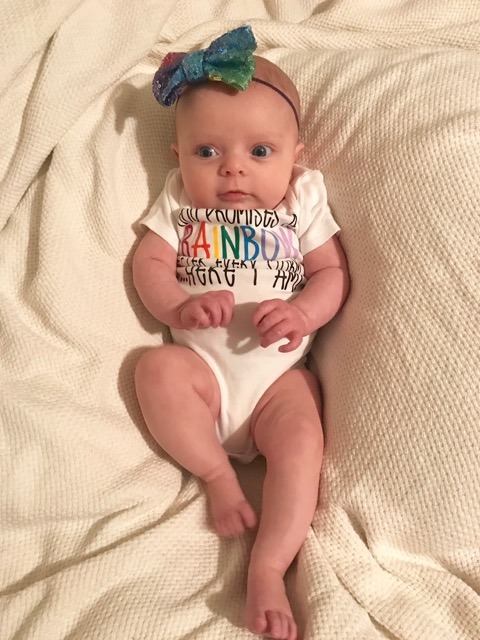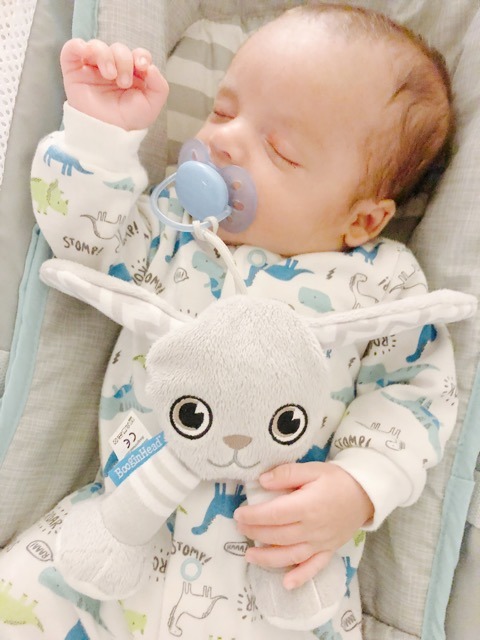Text
Why Rainbow Babies Are So Special
Rainbows have always been a symbol of peace, hope and positivity. We look for rainbows after a storm - when the rain stops and the sun breaks through the clouds and shines bright light down on the earth. “Rainbow babies” are those who are conceived after a loss -- these babies are so special because they represent a bright light of hope and joy that can help families recover from a challenging time in their lives.
Whether you’ve experienced a loss yourself, or you’ve stood by a mother/daughter/sister/friend and supported her on this difficult journey, it’s important to recognize that families are not alone in this process. According to Mayo Clinic, approximately 10-20% of known pregnancies result in a loss. It is normal to grieve and go through a variety of emotions when making the decision to try again. We’re honored to have cultivated such a supportive, loving community of women who are willing to share their real, raw, emotional stories in an effort to help one another.
In honor of the women who’ve experienced a loss, and all of the rainbow babies who represent healing and love, we’d like to celebrate you by sharing some real stories (and adorable photos!) from the Glow community!

“Our rainbow baby girl after two miscarriages 😍🌈” - Glow App user, Holly

“In 2017, I had a little boy at 24 weeks, his name was Brysen. He was one pound seven ounces. I had a 40% placental abruption and was bleeding out, and the doctors were forced to deliver him by emergency c-section. I had three blood transfusions, two platelet transfusions. He fought three long and very hard days before losing his battle. The only time I got to hold my first baby boy, was the moment he took his last breath in my arms. His breathing was so labored, it almost seemed as though he waited to get into my arms. I held him for about twenty seconds before my beautiful little man took his last breath, almost as a sigh of relief. In March of 2019, I delivered my beautiful rainbow baby. He is the light of our life, and I am so happy I got my beautiful rainbow, even after the hellacious storm.” - Glow App user, Laney

“Our sweet William James. We struggled with unexplained infertility for six years. After every treatment I finally gave up and just wanted to focus on traveling and just being with my husband. Three months later, In July of 2018, we found out we were expecting our rainbow. He was born 3/13/19 🌈” - Glow App user, Megan

“This is Fox! We had one loss at twelve weeks and a few months later got pregnant with him...and here he is now at age two eating rainbow sprinkles😂” - Glow App user, Ashley

“Your app helped me get pregnant with my rainbow baby. She’s our greatest blessing AND we are due with our second baby girl in August! Thank you so much!” - Glow App user, Kimberly

“This is my Sweet Lyla Grace. Being pregnant for the first time ever I miscarried one week after my birthday. I was shattered. I’d never hold that baby in my belly or arms, but I’ve always held them in my heart. I was truly blessed to fall pregnant two months later with my rainbow baby. I remember feeling half on cloud 9 and half so scared my whole pregnancy that something would happen. No matter what I tried I was too scared to be happy. If I could tell myself back then everything happens for a reason I would. My beautiful daughter was born and she is the best thing that’s ever happened to us. She just turned one last week and now I’m six and half months pregnant with her sister! She will always be my saving grace and my rainbow after the storm.” - Glow app user, Becca
A huge thank you from the Glow team to everyone in our community for sharing your beautiful, inspiring stories!
19 notes
·
View notes
Text
Have you heard? Glow is Revolutionizing Access to Fertility Treatments
We’ve helped over 500,000 women get pregnant, and are now ready to help millions more.
Find out how!
3 notes
·
View notes
Text
Polycystic Ovarian Syndrome, and the Questions to Ask Yourself
September is PCOS Awareness Month, and at Glow we take that seriously. More than a couple of Glow team members have PCOS, and since it affects over 5 million women in the US alone, you probably know more than just a few women with PCOS, too.
But what is PCOS?
PCOS stands for Polycystic Ovarian Syndrome, it’s a condition that can affect a woman’s periods, weight, hormones, fertility, appearance and heart. There is no cure, and no known cause, so dealing with PCOS can seem like a constant uphill battle.
To get some insight into this puzzling condition, we asked the Glow Community about their experiences.
In a poll with 1,515 participants, Glow Community members told us when in their lives they were diagnosed with PCOS.
The majority of those who participated in the survey (39%) said they were diagnosed with PCOS in their twenties. Another 25% of participants said that they haven’t been officially diagnosed yet, but suspect they may be showing symptoms.
One of the most troubling things about PCOS is the fact that it often goes undiagnosed, sometimes for multiple years. One Glow Community member wrote, “I went undiagnosed for 15 years! 😩 just found out a couple weeks ago. I knew it! But for years the doctors just brushed it off like nothing.”
One of our very own Glow Fertility Coaches went through a similar situation; “My periods disappeared when I was 18, they just stopped happening. When they did periodically reappear, I was left crumpled on the floor in agony. My gynecologist at the time brushed it off, saying that cramps were normal and to let it work itself out. At 28, my husband and I were ready to start our family, but were having no success. I went to another gynecologist and she diagnosed me with PCOS. It took me 10 years to be officially diagnosed.”
You may now be wondering, ‘Do I have PCOS? Maybe my periods aren’t as normal as I thought? Is that going to cause extra roadblocks to getting pregnant? How do so many women handle this condition?’
If you think you might be experiencing some PCOS symptoms, ask yourself these questions, then talk to your doctor!
5 notes
·
View notes
Photo

Curious about how sexy summer REALLY is?
😉
https://glowing.com/eve/2017Summer
8 notes
·
View notes
Text
How the Glow Community Spends Mother’s Day
Motherhood is special, and it’s fitting that a whole holiday exists to honor moms everywhere. That said, for some women, Mother’s Day isn’t the easiest holiday to get through. For people who struggle with infertility, or have lost their mother recently, this Sunday in May can sting.
In a Glow Community poll, we asked users who were trying to conceive how they planned to spend Mother’s Day. Over a thousand women responded, with the majority reporting that they planned to spend the day “Celebrating others.” Even so, “Ignore it” and “Cry” were the next most popular answers. Let’s just say, it can be emotionally draining to see what seems like all of your friends smiling and enjoying their large, fertile families during this particular spring weekend.
Step moms can also go through an emotional roller coaster on Mother’s Day. Some Glow users expressed feeling unappreciated by their step children, even if they’ve been loving them for a decade or more.
If you’re one of our users who chose “Ignore it,” or “Cry,” Glow is here to tell you that those are both totally acceptable responses. Be in tune with your mind and body; it’s fine to sit with these emotions. Also, if you sense you may feel sad this mother’s day, stay off the internet! Unplugging from social media and spending time doing something you love is a much more constructive approach to the the holiday. And always remember that Glow is here for you! You’ll be surprised at how many women in the Glow Community could be feeling the same things as you this weekend.
0 notes
Text
We’re collaborating with NIH!
Science and data lovers, this one’s for you.
This morning, we announced our new collaboration with the National Institute of Health. If you’ve already read the announcement and the technical speak went over your head, don’t be embarrassed! Here’s the breakdown:

What does all that fancy medical language mean?
In a nutshell, two researchers from the National Institute of Health created a model to figure out how to predict a couple’s likelihood of conceiving, but they only had study-specific data -- not real world numbers. Since we at Glow collect real-world data on the exact topics the researchers were investigating (menstrual cycle length, intercourse patterns, etc.), and because we have humongous quantities of that data, we’ve agreed to share our anonymized data with NIH to help improve their model!
But that’s my data!
Not to worry, friends. The data we’re sharing with NIH is completely anonymized, which means it can never be traced back to you.
Okay, cool. So what does this model being improved have to do with me?
It means that YOUR data will advance research and help families for years to come! Every time you log cramps, mood swings, period flow or sexy time in the Glow app, you’re helping more and more future couples get pregnant, or at least understand their chances. You’re basically superheroes. 👍💁💜
Want to learn more? Check out our official press release here.
2 notes
·
View notes
Text
5 Things Data Can Teach You About Infertility
When we talk about infertility, we often hear individual stories and experiences — it can be hard to grasp what’s happening at a population level. But it’s not impossible! Millions of women across the country use mobile apps to track their fertility, and this data can be anonymized and analyzed to advance our understanding of the condition.
In honor of National Infertility Awareness Week, we dove into the data contributed by our Community of 8M+ women to see what we could learn about infertility. The results surprised us! Here’s what we saw:
1. Infertility rates differ by state.

Washington DC, Florida, and Hawaii see the highest rates of infertility, according to Glow data. And the most fertile population on the Glow app hails from Vermont — must be something about that Ben & Jerry’s :)
See what other super interesting facts we learned, here!
3 notes
·
View notes
Text
Watch Pregnancy Reveals from the Glow Community!
There’s nothing quite like “the big moment” of telling your loved ones you’re PREGNANT!
Glow knows. So we asked you, our fantabulous inspiring Glow Community members, to send us original footage of your very own pregnancy reveals!
You delivered, and we were able to make this beautiful video because of it:
youtube
Take a watch and upvote if you it makes you smile! Thanks for the tiny miracles you create every day, and the joy you bring to our lives :)
#pregnancy#pregnancy reveal#pregnancyreveal#pregnancy reveals#pregnancyreveals#i'm pregnant#pregnant#preggo#preggers#mumblr#community#health#family#family planning#what to expect#women#womenshealth#womens health#parenting#trying to conceive#ttc#ttc community#bfp
3 notes
·
View notes
Text
Announcing the 🔻Eve. Ambassador Program🔻
Guys, starting today, Eve has an Ambassador Program. GET PUMPED 💪
Basically this is your chance to build the period positive + sex positive + body positive world you wish to see, and get ah-mazing & FREE Eve swag while doing it.
Read more about the program here and join our *brand new* Eve Ambassadors group to stay in the loop!
Here’s how to find it:
First, click the search icon on the upper right of Eve Community.

Then, type in “Ambassador”, select “Groups” and then click the “Join!” button next to the Eve Ambassadors group!

As an Evette, you know that sex and periods are NOT something to be ashamed of. Our bodies deserve love! And we need to lead the way in spreading that love to all the ladies.
Check out the Eve Ambassador community group and this post for next steps :)
#eve#ambassador#sex#sex positive#period#period positive#body#body positive#bodypositivity#body positivity#women#womens health#health app#period tracker#period tracking
1 note
·
View note
Text
Who won sex in 2016?
Guys, this year was hot AF. SO MUCH SEX HAPPENED. And Eve has the dirty details: https://glowing.com/eve/2016
Check it out and and share with your squad because, honestly...

XOXO,
Eve
4 notes
·
View notes
Text
Introducing Glow Pages: A most fabulous fertility resource
Why ask one friend about her experience with fertility when you can hear from millions? Our newest feature Glow Pages collects the experiences of millions into one searchable directory. Glow Pages provides crowdsourced reviews of fertility clinics and products, searchable both online and in the Glow app.

Consider it the next step in our mission to empower you and your health :)
#glow#glow pages#fertility#infertility#ivf#iui#trying to conceive#ttc#getting pregnant#assisted fertility#fertility clinic#fertility medications#health#women's health#reproductive health#family planning#glow community
0 notes
Text
How To Talk About Testing
New lovers are so fun but so tricky. You’re trying to figure out if they *actually* like you, and then there’s the physical stuff: holding hands becomes a first kiss, clothes come off, you’re sleeping over…
Before things get too hot and heavy, it’s a good idea to have the talk. Yep, the talk—the one where you learn about past sexual history and when they last got tested for STIs.

This may sound like an insanely awkward convo, but in general, women are unfazed. Over 60% of women discuss past sexual histories before sleeping with their partner, and almost 20% of women require their partner to get tested before sex, according to polls in Glow Community.
These women are wise: Recall that 1 in 3 Americans currently has a sexually transmitted infection (STI). And STIs can be transmitted via a number of intimate situations; they’re different than pregnancy, so they’re not limited to P-in-V sex!
No matter how cringe-worthy it is to bring up STIs, it’s way better than freaking out because you don’t know your partner’s status. So, how do you float the topic without killing the mood? A few ideas:
Setting Matters
Find a private spot for the conversation—your place, their place, maybe even in bed! Feeling a sense of privacy will help both of you feel comfortable opening up. Definitely avoid bars, restaurants, and other public places; the last thing you want is an interruption (or an eavesdropper)!
Say You Like Them
Real talk: It’s 100% amazing to hear your someone say that they’re into you! Why not give that gift to your crush? If you’re feeling good about how things are going, say it out loud. It’s a sure way to get your crush smiling. It’s also a natural lead-in to talking about how things have been heating up—a fact that you should both pause to acknowledge.
Float the Topic
Your crush is going to feed off your energy, so why not keep it light-hearted? Here are a few lines you can experiment with, depending on your style:
The Cool Cucumber: “Hey, tell me about your last relationship!”
The Smarty Pants: “Just want to make sure we’re being smart how we proceed here...when was the last time you got tested?”
The Clean Machine: “I’m clean and I’m planning on keeping it that way so...anything I should know about?”
The Popular Girl: “A friend of mine got an STD recently, so I’m trying to be extra careful moving forward. When was the last time you got tested?“
The Holiday Lover: “In honor of STI awareness month, tell me about last time you got tested!”
Being casual about whichever line you choose sets the expectation that the convo is totally and completely normal. And initiating in general shows that you’re a total badass and not afraid to break the ice with hard Qs. People find that kind of thing unbelievably hot :)
The T Word
Your crush might give you tons of details on past sexual partners and testing, but if they don’t, it’s fair game to be direct. Choosing to intertwine your bodies means choosing to intertwine your health, and you have a right to know what you’re getting into!
If your crush is super experienced with the testing process, then they’ll know the drill. If it’s someone who’s unfamiliar with the process, this is your opportunity to be supportive and show what you know. You can tell them to talk to their doctor, or just order an STI test online and get tested at home! There are a few different at-home STI testing services—myLAB Box is our favorite.
Lead By Example
If you really want to be a leader, you can get tested before you even initiate the conversation. Doing this shows that you take testing seriously, and that you’re more than willing to meet halfway. Having your free-and-clear test results in hand puts you in a great position to open up a discussion about sexual health.
These are hard convos to have, but obviously you’re going to rock it. Best of luck, heart eyes! See you on the other side ;)
#sex#realtionship#relationships#love#sti#std#sexualhealth#sexual health#healthy relationships#dating#dating advice#womens health
3 notes
·
View notes
Text
This Is When Your Skin Will Be Amazing, According To Your Period
Acne is the freaking worst. Clearly you wish you knew what was causing it, right? Well, look no further than your menstrual cycle — turns out the hormones that make you get your period are behind a bunch of other stuff, too.
We dug into our Eve data to see when in your cycle you can expect fabulous skin, and when you’ll want to hide your face. Then we blogged about it on Medium. Check out what we discovered here!

#skin#acne#skincare#hormones#hormonal#period#periods#menstruation#health#womenshealth#womens health#birth control#mumblr#makeup#my face#acne treatment#acne cure#acne care#breaking out#menstrual cycle#cycle
1 note
·
View note
Text
A to Zika
Back in March, we assured you that you didn’t need to panic about the Zika virus. While we acknowledged that the virus was a real condition that was causing birth defects for a growing number of babies in Brazil, it was nothing to worry about for the average American.
Unfortunately, the threat of Zika has grown in the past six months, and the press freak-out has been intense. Reporters and bloggers have warned us to avoid honeymoons and babymoons anywhere near Zika-infected areas. Some athletes even chose to skip the Rio Olympics due to risk of Zika exposure.
Wondering if it’s time to freak out, right? We are, too. To start, here’s what’s changed about Zika since March--and what you can do to protect yourself whether you’re pregnant, trying to get pregnant, or just intent on staying healthy.

Something you definitely don’t need to panic about: mosquitoes the size of kittens
In March, Zika was a serious threat in Brazil only. Since then, Zika has also penetrated the Caribbean and all of Central and South America; the CDC has updated their travel warnings accordingly. Until July, the only instances of Zika in the continental U.S. were contracted when traveling in infected areas. Then Zika-infected mosquitoes turned up in Miami. Forty-nine people have been infected in the Miami area since.
What's more, mosquitoes are no longer the only beings to blame for Zika's geographical movement; recently we've seen a few cases of American women contracting Zika from sexual contact with infected men. In addition, it turns out that Zika doesn’t just put your baby at risk. Research published just last week shows that those infected with Zika have a higher risk of developing Guillain-Barré Syndrome—a rare condition that causes the immune system to attack nerves and leads to progressive paralysis.
In spite of how scary this sounds and how intimidating the media frenzy is, it’s not worth panicking just yet. Widespread spraying of the affected areas is already happening in Miami, so mosquitoes carrying Zika are unlikely to rapidly move to other parts of Florida (fun fact: Zika-transmitting mosquitoes typically travel less than 400 meters in their entire lives!). Experts say that local mosquitoes are only likely to spread Zika where they’ve previously spread other illnesses, like dengue fever. That narrows the field to small portions of southern Florida and the southern tip of Texas.
Of course, Zika will continue evolving, as viruses do, and the virus will will most likely begin to improve its person-to-person (instead of mosquito-to-person) transmission, so we’ll have to keep an eye on that. What’s more, scientists are working quickly to develop a vaccine for Zika— in fact, it’s already being tested in humans.
So, unless you travel frequently to Latin America or live in Miami, it’s unlikely that Zika will affect your life very much. Despite your location, it’s worth it to take a few precautions. Here’s how you can stay safe, whether you’re trying to conceive and planning travel in Latin America or just working to have the healthiest pregnancy possible:
Wear insect repellent, especially the kind that contains DEET. Especially important in tropical areas, but useful everywhere. Zika isn’t the only disease mosquitoes carry, and bug bites are annoying, even if they’re not transmitting anything but a nagging itch.
Use condoms when having sex with a new partner. This is a good practice in general, but especially when you’re canoodling with someone who’s been traveling (most especially if their travels have brought them to Florida or Latin America!) If you’re pregnant or trying to make a baby, make sure your partner also limits travel to high-risk areas and wears insect repellent if/when he or she is on the road.
Talk to your doctor about further precautions to take or if you have any questions. She’ll know the specifics of your situation and will be able to advise you accurately.
Stay safe out there, friends!
0 notes
Text
A Company Update from Glow
When we first started Glow, we were driven by the possibility of what data could do to advance knowledge about reproductive health. Mike (our CEO) and his wife experienced troubles conceiving and went through multiple rounds of infertility treatment before having Kaylee. We also understood that not everyone has the luxury of affording those costly treatments. That having a child should fundamentally be a human right. But the way our system is set up, that simply isn’t the case. If data and Glow could help more women conceive naturally, saving thousands in medical costs, we certainly had to try.
Recently a security concern was discovered in one of our apps. When it was discovered, we fixed it swiftly; we addressed and released a fix within days. We immediately emailed our customers about what happened and advised them to take precautionary measures to change their password and update the Glow app on their phone. We are thankful to Consumer Reports for flagging the concern. We’re also extremely relieved that the error did not result in any customer data being compromised.
What we care about most is retaining our customers’ trust.
Glow has never taken customer data lightly. We know we have extremely personal information and it is our duty to keep it safe, which we will continue to prioritize as an organization.
To this end, we are investing in a third-party security audit to independently confirm to our customers that their data is and will remain safe. And although we are not required to be HIPAA compliant, we will become compliant in 2017 to further ensure our users’ privacy.
We’re focused on improving health outcomes for millions. The numbers speak for themselves: well over 300,000 pregnancies have been reported on Glow. Active users on the Glow app were shown to be 40% more likely to conceive, as we presented with Philip E. Chenette, MD at the annual meeting of the American Society for Reproductive Medicine, on October 21, 2015. The fact that our apps help women understand their bodies and improve their health is what has inspired more than four million women to use our products.
Our apps work because they incorporate the latest medical knowledge and research - not just methodology from the 1960s. A study published in the Journal of the American Board of Family Medicine recently called our efficacy into question because it started with the assumption that a limited set of fertility awareness-based methods (FABMs) were the only acceptable ways to track fertility. An app could only score on the study’s “authority” measure if it explicitly adhered to the methodology of one of the FABMs that the organizations authors’ supports, making the study inherently biased against other methods that may be just as viable. Instead of using one of the FABMs that the authors support, we have built a proprietary algorithm to help our users track and measure their fertility. Our algorithm uses the exact same biomarkers as the FABMs endorsed by the study’s authors (e.g. CM, BBT), and, in most cases, offers a more data-intensive method. We think it’s important to leverage the latest technology as well as more traditional methods to help our users understand their fertility.
Our medical advisors reviewed the study and found it to be extremely light in facts and figures. Specifically, after consulting with one of our medical advisors, Dr. Philip Chenette pointed out that the study didn't share how scores were computed. Reproducibility is a core tenant of generally accepted study methodology. From an academic standpoint, lack of disclosure of computational methodology would make it difficult for anyone to reproduce the study’s results or challenge any of the assumptions inherent in the study. We also clearly state in our Terms of Service, and as in-app disclaimers, that Glow products should never be used as a substitute for contraception - a fact that the study ignored. We reached out to the authors to discuss the merits of the study as well as our disclaimer when it was first published. They responded last week, noting that they would submit an addendum to the publication, excluding Glow from the study entirely.
We leverage our esteemed board of medical advisors to ensure our apps’ content reflects their medical expertise - men and women with highly specialized experience in subjects such as endometriosis, endocrinology, pediatric, male fertility, and neonatology to name a few. Because of their aptitude, Glow has led the industry in many firsts. The first to offer support of women from period to parenting; the first to offer postpartum support; the first to incorporate miscarriage support; the first to offer insights into male fertility (40% of infertility cases stem from male-related issues).
What’s more, we submit our data analyses to top medical conferences for peer review as part of our efforts to advance research in reproductive health. We have presented new findings from our data to the American Society for Reproductive Medicine for each of the past two years and we plan to submit our third paper to the medical community later this year. And we continue to do more to advance research to further our understanding of reproductive health. We do this because we believe that data not only empowers the individual, but will serve to bring us massive insights about this subject at large.
Measuring the definitive impact of consumer-directed health apps is not a straightforward or quick thing to do. We can talk the talk about our successes—but our customers are the ones walking the walk. They remind us of the impact of our apps every day. Cristen D. leaned on the women of the Glow Community when she lost her baby to an ectopic pregnancy; she ultimately conceived again three months after her loss. Glow helped Josie V. find a better birth control method when she had trouble with her IUD and led Nikki B. to discover she had Polycystic Ovary Syndrome (PCOS). Milah F. had a hard time understanding her cycles and what she needed to do to conceive, especially in light of her PCOS. After spending three years trying to get pregnant with her first, she conceived her second in just three months on Glow and continued on to Glow Nurture to track her pregnancy and connect with other moms-to-be in her area.
We are grateful to be able to support women and men as they create families, and impact present and future lives. We remain committed to this responsibility, and we are in it for the long haul.
--Max Levchin (Chairman & Co-Founder) & Mike Huang (CEO & Co-Founder)
5 notes
·
View notes
Text
Treat Yo’ Self with Glow Premium Rewards

Glow Premium just got even better! Your Premium subscription now includes Glow Premium Rewards, which gives you hundreds of dollars of exclusive savings on your favorite brands. We’ve joined forces with a bunch of amazing companies that will help support you from period to parenting and stretch your budget at the same time.
That’s right -- you actually make money on your Premium subscription now. You’re welcome ;)
With Premium Rewards, you can:
Pamper your period with Thinx, Flex, Lola, Pink Apple and, Maxim Hygiene
Spice up your sex life with Sustain, OMGYes, Dame Products, Undercover Condoms, myLAB Box, and Uqora
Maximize your fertility with Ava, Clearblue, and Stork OTC
Power your pregnancy with Mayarya, Americord, J-Screen, Three Lollies, and Bundle Organics
Power your parenting with UrbanSitter, Baby Bargains, Babiators, and Icon
Take care of everything else with DoorDash, Ditto, and AC Lens
Starting today, you can access all these $weet deal$ in Eve. Premium Rewards will go live in Glow, Glow Nurture, and Glow Baby in the next few weeks, so stay tuned!
Go forth and treat yo’ self to an affordable shopping spree on us! We know you want to. After all:

P.S. If you haven’t subscribed to Premium yet, head to your Me page in your app to upgrade today!
1 note
·
View note
Text
The Social Lubricant
Women drink. 60% of all U.S. women, and over 75% of women on Glow, to be precise. Drinking is fun. Sex is too! Sometimes they combine to make a great cocktail, but other times, not so much. What’s the best recipe to combine the two?

Sex and drinking have been in the news a lot recently — and haters and lamer sections of society love nothing more than blaming women when sex and drinking go south. Women are told that any dicey sexual encounter that happens under the influence is “our fault,” that dressing more conservatively and not staying out late will help keep us safe.
None of that BS is true. Alcohol may sometimes be a factor in sexual assault cases; it is never the “cause” — and it is never, ever a woman’s fault when she is sexually assaulted, no matter her BAC.
We’re committed to changing the conversation around alcohol and sex. So we took a deep dive into our Glow data to investigate. This is what we learned.
#sex#alcohol#drinking#drinking culture#health#womens health#social drinking#wine#beer#liquor#rape culture#sexual assault#sex positive#sexy#party#party culture#pre game#data science#data
2 notes
·
View notes